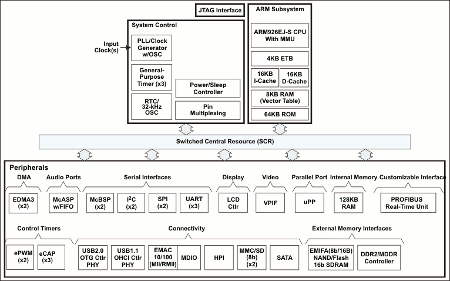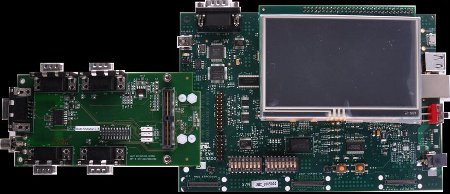Programmable ARM9 SOC available in Profibus version
Nov 23, 2010 — by Eric Brown — from the LinuxDevices Archive — 24 viewsTexas Instruments (TI) announced a new member of its industrial-focused, ARM9-based Sitara AM1x system-on-chip (SoC) family that adds an integrated Profibus interface. The AM1810 Sitara is clocked to 375MHz, includes EtherCAT support, and ships with a Linux-ready development module, says the company.
The AM1810 Sitara is said to be optimally suited for use in programmable logic controller (PLC) or human machine interface (HMI) applications. The SoC is based on the Sitara AM1x line of ARM9 processors TI announced in April.
The processor appears to be identical to the top-of-the-line AM1808 model, except for the addition of the Profibus interface as well as EtherCAT Master protocol support.
In conjunction with the AM1810 Sitara's release, TI noted that it has joined the Profibus International (PI) organization. Profibus is an industrial fieldbus such as CANopen and LONworks, billed by TI as "the world's most popular fieldbus used for communications between factory automation equipment."
The TI Profibus DP slave implementation used on the AM1810 Sitara has earned PI certification via ComDeC, a Profibus Certification Lab hosted by Siemens AG, says TI. By integrating a Profibus interface in the AM1810, directly linking it to the RS-485 transceiver, there is no need for an external Profibus device, ASIC, or FPGA, says the company. This is said to save development time and cost while improving system performance.
Customers can also design smaller enclosures and housings with simpler thermal designs due to the AM1810 SoC's low power architecture, says TI. The thermal advantage is claimed to further reduce total bill of materials (BOM) savings to up to 30 percent.
Customizable PRU spawns Profibus interface
Unlike the flagship, Cortex-A8-based Sitara AM3505 and AM3517 SoCs announced in October 2009, the industrial-focused AM1x Sitara processors use more modest 375MHz to 450MHz ARM9 cores, and lack video acceleration DSPs (digital signal processors) or OpenGL ES 2.0-based PowerVR SGX graphics accelerators.

AM1810 Sitara block diagram
(Click to enlarge)
On the AM1810, the PRU is used to implement the Profibus real-time frame handler, called the Fieldbus Data Link (FDL). The PRU is tightly coupled with the ARM core through an on-chip system bus, yielding shorter control cycle time and increased system response time compared to a standard Profibus interface, says TI. The device is claimed to offer decentralized peripherals (DP) communication at up to 12 MBaud.
The Profibus node can even run without external memory, booting through serial flash and running on internal RAM, says the company. An operating system (OS) abstraction layer, meanwhile, is said to make the Profibus DP protocol stack independent of the OS.
The AM1810 Sitara ARM MPU also supports the EtherCAT Master protocol on its integrated Ethernet port. This allows industrial designers to develop products with multi-protocol support, says the company.
An AM1808 with a dash of Profibus
As noted, the AM1810 otherwise appears to be identical to the AM1808. The AM1810 has its ARM926EJ-S core clocked to 375MHz, and offers an Enhanced Direct-Memory-Access Controller 3 (EDMA3), as well as dual external memory interfaces, says TI.
I/O includes a 10/100 Ethernet MAC and both a USB 2.0 on-the-go (OTG) and USB 2.0 Host interface, says TI. Other interfaces include I2C, SPI, UART, PWM, eCAP, McASP, and SATA, says the company. (For more details on the AM1810 Sitara, see the datasheet link at the end of the story, as well as our earlier coverage of the AM1808, here.)

TMDXEVM1810 evaluation module
(Click to enlarge)
The module ships with a software development kit (SDK) that includes a Linux kernel 2.6.33 board support package as well as Windows Embedded CE. Additional SDK features include a PRU configuration tool, PRU CAN, PRU UART, and touchscreen demo, says TI.
In addition to the EVM, TI Design House partner Critical Link LLC offers a "production-quality" industrial ETX standards based development board equipped with an AM1810 Sitara processor priced at $749, says TI. The ETX board ships with a real-time Linux (RTL) kernel board support package with the Profibus demonstration and evaluation software.
Stated Ram Sathappan, industrial end equipments manager, Texas Instruments, "We are very excited to be a member of PI and introduce our certified AM1810 Sitara ARM MPU Profibus solution to the industrial market. Our aim is to help our customers reduce BOM costs, PCB space and design time."
Availability
The AM1810 Sitara ARM MPU with Profibus is now available for sampling at $9.95 in 1,000 unit quantities (1ku) from TI and TI authorized dealers. More information, including a datasheet, may be found here.
The TMDXEVM1810 evaluation module (EVM) appears to be available now for $995. More information may be found here.
More information on TI's automation solutions may be found here, and more the ComDeC certification for Profibus may be found at Siemens, here.
This article was originally published on LinuxDevices.com and has been donated to the open source community by QuinStreet Inc. Please visit LinuxToday.com for up-to-date news and articles about Linux and open source.